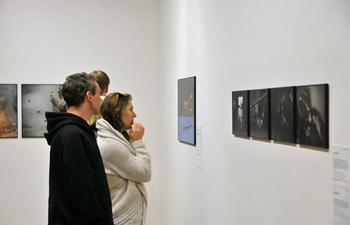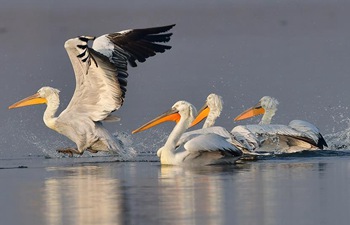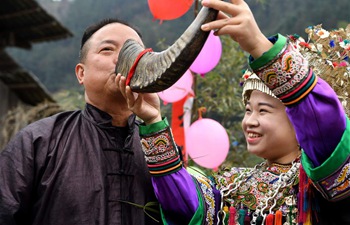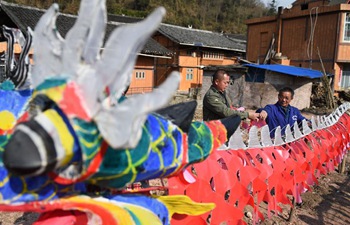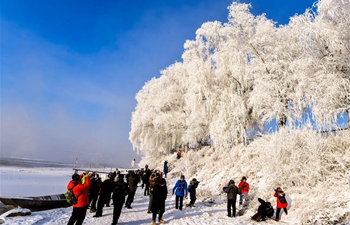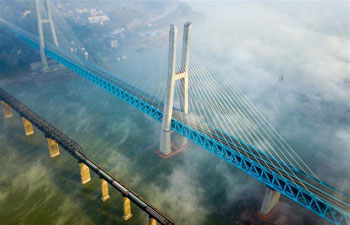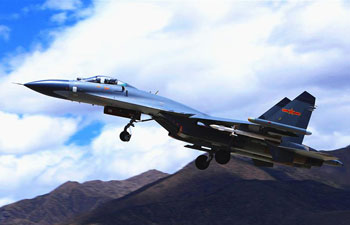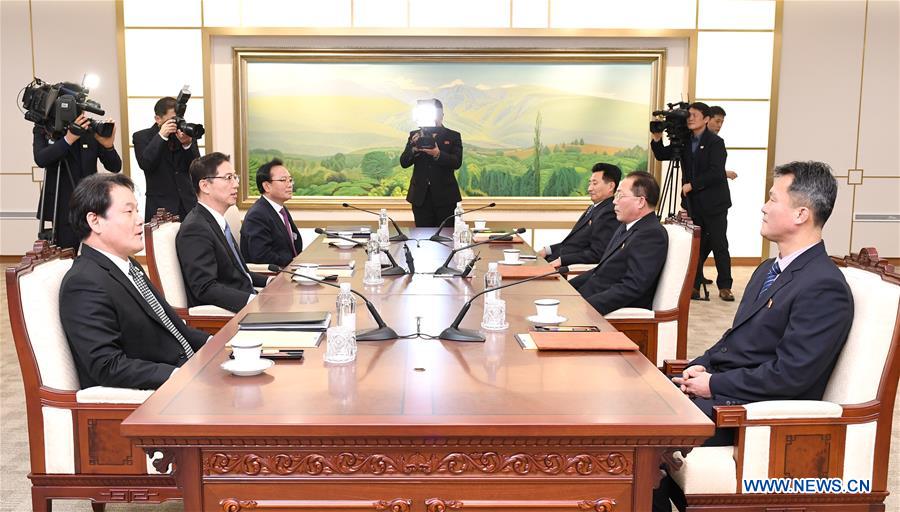
South Korean delegation (L) and the Democratic People's Republic of Korea (DPRK) delegation hold talks at the truce village of Panmunjom, Jan. 17, 2018. Working-level talks between South Korea and DPRK were underway Wednesday at the truce village of Panmunjom to discuss the DPRK's dispatch of athletes to the South Korea-hosted Winter Olympics, Seoul's Unification Ministry said. (Xinhua/South Korean Unification Ministry)
by Yoo Seungki
SEOUL, Jan. 17 (Xinhua) -- South Korea and the Democratic People's Republic of Korea (DPRK) will repeat symbolic reconciliation events as seen in the past international sports events as the two sides agreed to jointly march under one flag and cheer together during the upcoming Winter Olympics.
The agreement was reached at the vice ministerial-level talks between the two Koreas, which were held Wednesday at the Peace House, a building in the South Korean side of Panmunjom straddling the heavily guarded inter-Korean land border.
The two sides agreed to let their athletes march together under a unified flag of the Korean Peninsula at an opening ceremony of the 2018 Winter Olympics and cheer together for both athletes from the two Koreas during the Winter Olympics that will run from February to March at South Korea's east county of PyeongChang.
It would be the repetition of the reconciliation scenes which had been seen many times under the governments of liberal South Korean presidents. Such scenes disappeared for the past 10 years under conservative governments of South Korea.
Athletes from South Korea and the DPRK marched together at the opening ceremonies of the Sydney Olympics in 2000 and the Athens Olympics in 2004, carrying a unified flag that has a blue picture of the Korean Peninsula in a white background.
Though the athletes competed as separate countries in 2000 and 2004 with their own uniforms, flags and national anthems, marching together itself had a symbolic meaning for inter-Korean reconciliation. While cheering together, people living in the divided peninsula restored the sense of national homogeneity and the importance for peace.
In 2000, then South Korean liberal President Kim Dae-jung and then DPRK leader Kim Jong Il held the first historic inter-Korean summit meeting in Pyongyang. It was followed by the summit meeting in 2007 between then liberal South Korean President Roh Moo-hyun and Kim Jong Il.
The two Koreas marched together at the opening ceremonies of the Doha Asian Games in 2006 and the Changchun Asian Winter Games in 2007, but there has been no such scene found since then.
One of the most symbolic scenes during the PyeongChang Winter Olympics will be the ice hockey competition to be attended by the first joint Olympic team between the two Koreas.
South Korea and the DPRK agreed to field a joint women's ice hockey team for the 2018 Winter Olympics. In 1991, the two Koreas formed a joint team for an international table-tennis championship and youth soccer tournament, but there has been no unified Olympic team yet.
If the International Olympic Committee (IOC) allows it, it would be the first unified Olympic team of the two Koreas. South Korea and the DPRK had to ask for the increase of number of entry to allow both athletes from the two sides to participate in the competition.
South Korean President Moon Jae-in, who took office in May last year, offered in June to form a unified team with the DPRK for the Winter Olympics.
Fielding a joint team this time had been seen as being too late, but the door was open as top DPRK leader Kim Jong Un showed his willingness to participate in the sports event and actively responded to South Korea's dialogue overtures.
The two Koreas also agreed to hold a joint cultural event at Mount Kumgang, the scenic resort in the DPRK's eastern region, before the Winter Olympic kicks off on Feb. 9.
The DPRK will dispatch a large orchestra and a demonstration team of Taekwondo, a traditional Korean martial art, for concerts and demonstrations during the Olympic period. It will make the upcoming Olympic a venue for cultural and sports exchanges between the two Koreas.
The DPRK delegations will use a land route in the west region to cross the inter-Korean border to South Korea. It will be meaningful and symbolic for peace on the Korean Peninsula.




